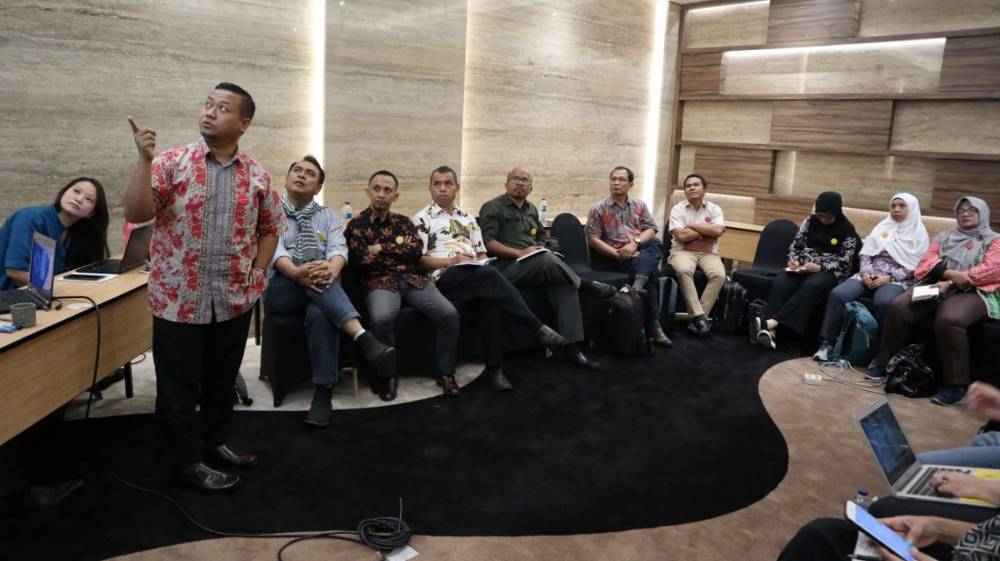WORKSHOP ON CLIMATE CHANGE
Jakarta (Indonesia), 26 April 2019 – SCOPI secretariat organised the workshop as back to back event with Members Working Meeting. The workshop discussed how climate play a role in changing the coffee sector, and how coffee farming contributes to increasing greenhouse effect which ultimately factors into exacerbating global warming.
Attended by 11 participants from members, partners, and stakeholder, the workshop welcomed the attendance of resource persons such as Ms. Restu Aprianta Tarigan, SP. (Yayasan Bitra), Mr. Purnama Hidayat and Mr. Syamsu Dwi Jadmiko (Center for Climate Risk and Opportunity Management in Southeast Asia Pasific – CCROM-SEAP), and moderate by: Ms. Leony Aurora (SCOPI Advisory Board) and minutes of meeting is provided by Ms. Nina Rossiana (SCOPI Partners – RA).
CCROM Bogor Agricultural University started by sharing their analysis on the impact of climate change on coffee sector, pointing out the decreasing land for coffee fields – increasing temprature forcing farmers to move the fields to higher elevation. It is predicted in twenty to thirty years-time the areas currently suitable for coffee farming will reduce as some parts of the globe warm up which may not be suitable for certain coffee culture, and at the same time provides a suitable breeding ground for pest and diseases.
Farmers in general suffers from climate impact but to various extend, and significant majority of farmers do not understand climate knowledge, let alone possessing the capacity to cope.
As coffee farmers struggle to thrive amid the decreasing productivity in their farm plots, there is a tendency to expand farms with the intention to get more beans, more money. Forests are at risks, especially in the highlands where temperature are a little cooler, and this also means threat to species sheltered by these green covers.
One of SCOPI’s members, a civil society organization called BITRA is currently working in coffee regions in the vicinity of the Toba Lake, North Sumatera. BITRA reported that despite the declining productivity, the increasing infestation of pests and diseases and the unpredictable seasonal calendars, farmers did so little to nothing to address these challenges. They felt powerless. Farm productivity impacts their economy but and then what? How do you address issues that you do not understand
BITRA shared two approaches that were taken to promote climate awareness:
- Work with the farmers to identify climate related threats, how soil moisture content and nutrition affect coffee plant growth, the temperature, shades and rainfall affect harvest results.
- Conduct a scientific study to understand climate variables that mostly affect productivity. This study was assisted by Bogor Agricultural University’s Climate Center. The participants of the meeting agreed that if such study can be done across Indonesia to give insights to farmers on what, how and when knowledge. But this type of study requires resources, the people taking samples, doing the tests, working on hypothesis and data analysis, and it is not your typical qualitative FGD-like study where un-statistical persons can undertake. One important question was whether a blanket research suffices, considering the vast archipelago with distinct land features, another one was, who then can support the farmers to get climate knowledge. It is certainly not something that can be answered right away in a two-hour session with coffee actors. But this is something to follow up along our platform’s journey.
SCOPI’s Master Trainers is currently undergoing a mid-term impact review, SCOPI is working with its members and partners to determine how to best position the Master Trainers in the capacity building initiative and whether climate knowledge is another burden that the MT can willingly take?
Climate Change workshop provided the following recommendation/action plan:
- SCOPI must ensure MT’s knowledge about climate change and pests controll and diseases management to be integrated in the national curriculum of Master Trainer and Field Farmer School
- Collaborate with various stakeholders to further conduct studies related on corelation between climate change and coffee production. The workshop suggested SCOPI to replicate the CCROM study in North Sumatra in other location with different charatectistics and study related with comparasion of emission from coffee products with other commodities.
- Impacts and adaptation efforts regarding climate change must be studied further from upstream to downstream, from farmers to consumers. There needs to measure indicators of adaptation to climate change. The study will not be limited to research on production process and how the industry’s effort to reduce the negative impact and promotes the positive impact
- To initate joint effort among members and partners to increase awareness through public campaign on sustainable coffee and alleviate consumer appreciation for responsible coffee practicess and businesses
Another angle of looking at global warming is the carbon footprint produced by coffee farming or the coffee industry in general. The use of chemicals in farms potentially degrade surrounding environment, and especially farms that are not applying good agriculture practices, farming wastes could potentially pollute nearby body of waters that ultimately endanger plant and animal species living from them. In the processing phase, how much water used or the emission produced to get even one cup of coffee for a customer, these questions arise during the workshop. But the lack of simple or free-to use tool to calculate our footprints and to determine what we can do in terms of carbon offset may trouble actors who are keen to act upon responsible coffee business.
Presentations:
Bpk. Syamsu Dwi Jadmiko_Perubahan Iklim Dan Dampaknya Pada Pertamanan Kopi
Rizaldi Boer dan Team_Perubahan Iklim Dan Dampaknya Pada Pertamanan Kopi
WCS Kemitraan Mendukung Produksi Kopi Lestari Untuk Mengatasi Deforestasi di Bukit Barisan Selatan

